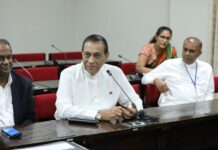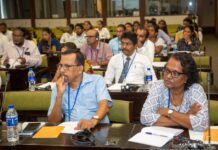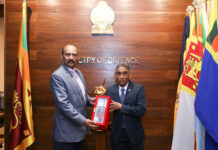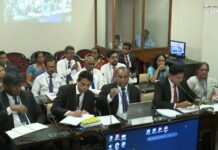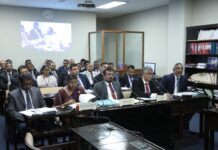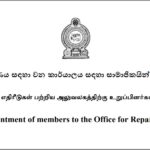Shasheendra Rajapaksa, State Minister of Promoting the Production and Regulating the Supply of Organic Fertiliser and Advanced Technology Agriculture yesterday invited all countries in the world to use Sri Lanka as a case study for organic agriculture.
“We invite all countries in the world to study Sri Lanka’s experiences in Organic Farming; our methods, outcomes and shortcomings because our concerted efforts in this direction will provide a more in-depth insight into developing Organic Agriculture practices,” he said.
He made these remarks at an event where Colombo Commercial Fertilizers Ltd. entered into a Memorandum of Understanding (MoU) with Polish venture capital firm Regina Purpurea Fundus to establish preliminary parameters to form a joint venture for an Organic Fertiliser manufacturing operation in Sri Lanka.
The MoU involves a Rs. 12.8 billion funding proposal from Poland for organic fertilizer production in Sri Lanka.
Describing the proposed joint venture as a public-private partnership to power agricultural revolution in Sri Lanka, the state minister said,” We started this process from end to the front. We made the decision of going organic in our farming last April and started implementing it from May 2021. We realized that when we start a grave task of this nature, we can’t think of an appropriate point of starting. We reviewed the ground situation first. Do farmers already engage in Organic Agriculture? How do they do it? What are the issues they face when switching to Organic Agriculture? We explored how other countries do this. We started it after studying all that. Today we have taken a decision to go for 100% Organic Agriculture in a systematic way.. The MoU we signed today would be a key step in that direction. The main need to realize this objective is the production of Organic Fertilizer. As the world has embraced this concept, we are trying to make Sri Lanka the first country in the world that engages in 100% Organic Agriculture. We need to learn from the world. We need to get insights from not only the local private sector but also from the foreign private sector. As we move forward in this journey, Sri Lanka will provide a good case study of Organic Agriculture to the world”.
This public-private partnership (PPP) was formalised in the presence of Secretary to the Ministry of Agriculture – Prof. Udith K. Jayasinghe, State Minister – Shasheendra Rajapaksa and Secretary to the State Minister – M. N. Ranasinghe.
The MoU was signed by Polish entrepreneur Hubert Drabik, Founder and President of the Board of Regina Purpurea Fundus, and Chairman of Colombo Commercial Fertilizers Ltd.
Regina Purpurea Fundus (RPF) is a Polish venture capital consortium working with development-oriented governments and organisations to invest in a wide range of initiatives aimed at sustainable economic growth both domestically and internationally.
RPF is supported by the Polish Ministry of Agriculture, the Polish Chamber of Commerce, and a number of state banks of Poland.
RPF intends to design, finance, build and operate the large-scale project with a total investment of LKR 12.8 billion, with proof of availability of funds.
The operation will be spread out across four plants in Trincomalee, Monaragala, Anuradhapura and Hunupitiya, supported by a testing and certifying laboratory, and will contractually produce an annual capacity of 200,000 metric tons of organic fertilizer for Colombo Commercial Fertilizers Ltd (CCFL) on an exclusive basis.
A comprehensive due diligence investigation of the investment proposal and funding capacity will be carried out by CCFL with mutual cooperation from RPF to its satisfaction within the next two weeks followed by Cabinet approval of the project. All parties will then enter into a more comprehensive Joint Venture Agreement with detailed conditions mutually agreed upon within three weeks from the signing of the MOU.
Poland’s RFP will produce organic fertilizer for Colombo Commercial Fertilizers Ltd in above mentioned capacity for 20 years, ensuring a return on investment (ROI) for the company before handing over the total project to Sri Lanka.
The Polish company said 100% Sri Lankan inputs would be used for the production of organic fertilizer at the proposed facilities and no ingredients would be imported for the purpose.





